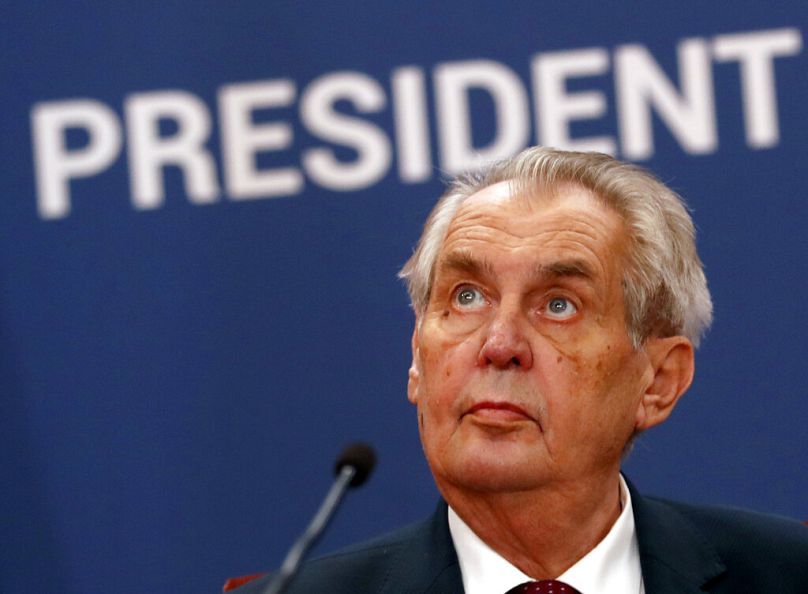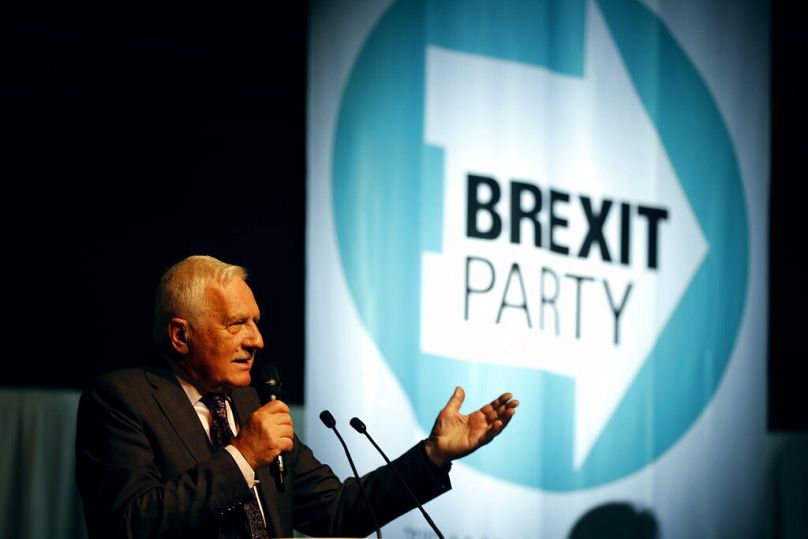Czech MPs have passed the first reading of a legal amendment that would criminalise social media firms if they ban content that is deemed to be in the public interest. It's being seen as an attempt by the Czech right-wing to fight back against the so-called cancel culture seen elsewhere in Europe
While the current trend in Europe appears to be censoring social media content, the Czech Republic is considering the opposite.
 ADVERTISEMENT
ADVERTISEMENT
 ADVERTISEMENT
ADVERTISEMENT
Czech MPs have passed the first reading of a legal amendment that would criminalise social media firms if they ban content that is deemed to be in the public interest.
It's being seen as an attempt by the Czech right-wing to fight back against the so-called cancel culture seen elsewhere in Europe.
The motion was brought forward to the lower house of parliament by Vaclav Klaus Jr, the son of a former prime minister and founder of the small right-wing Trikolora party, as well by MPs from various other political parties.
If passed, the amendment to the country's criminal code could lead to social media operators or administrators facing a three-year prison sentence, a temporary ban on activities or a hefty fine if they censor content that is either in the public interest or does not violate domestic criminal law or international treaties.
Czech MPs appear to be cutting their own path as other European legislatures introduce laws that require social media firms to remove content when demanded by national regulators.
Last May, France introduced a new government-sponsored law to compel social media operators to take down hateful content flagged by users within 24 hours. But the French Constitutional Council a month later struck down most provisions of the law as they were deemed unconstitutional, for violating freedom of speech.
In Germany, the 2017 Network Enforcement Act that requires social networks to remove content that infringes on hate and defamatory speech in the German Criminal Code has caught on elsewhere on the continent.
If ratified, the EU’s long-planned Digital Services Act, a draft for which was released by the European Commission last December, will greatly empower social media operators to choose what content they deem permissible or not through notice-and-action mechanisms.
Is this amendment about fighting back against 'cancel culture'?
Klaus Jr has proposed such a change to the law since at least 2018 and the amendment was first tabled in the Czech parliament in January 2019.
The coalition government opposes the measure. So, too, does the Pirate Party, the parliament's second-largest opposition group.
The amendment was co-sponsored by Radim Fiala, vice-president of the far-right Freedom and Direct Democracy party (SPD). Some members of the ruling ANO party, of Prime Minister Andrej Babis, also supported the amendment, as did lawmakers from the centre-right Civic Democratic Party (ODS), the largest opposition party.
Proponents of the amendment argue that not only does censorship by social media firms violate the EU’s Charter of Fundamental Rights, there are also currently no laws that stop the firms from deleting content posted on their platforms. The amendment has now been sent to parliament’s constitutional and legal committee for review.
Miroslav Mares, a Czech political scientist and expert on right-wing politics at Masaryk University, reckons there is a chance that MPs could adopt the amendment but it’s almost certain to be rejected by the Senate, parliament's upper house, or the Constitutional Court.
But even if it is eventually rejected, Mares added, the issue of free speech may become important on the political right’s campaign trail ahead of October’s general election, which is expected to be tightly fought and could see a number of far-right parties hold sway over which of the larger parties forms the next government.
According to a survey published in 2017 by global monitoring agency vpnMentor, the Czech Republic had one of the lowest rates of internet censorship in the world. But Mares said the issue of free speech is becoming divided between two competing narratives in Czech politics.
For some, Mares noted, the issue of free speech is tied to liberal democracy and the legacy of Vaclav Havel, an anti-communist figurehead who defined the Czech Republic’s liberal establishment when he became the first president of the country after the fall of communism in 1989.
In direct opposition, Mares added, are those who see the fight for freedom of speech as a rejection of “Western progressivism", a loose label by which they mean current debates surrounding “cancel culture”, political correctness and the limits of offensiveness.
“It means that traditional prejudices and expressions towards various entities are protected by these people, mostly from the nationalist spectrum around President [Milos] Zeman and Klaus,” said Mares.
'The new left wants to destroy freedom of speech'
Klaus Jr’s father, Vaclav Klaus Sr, was a major political figure in the 1990s, serving as prime minister between 1993 and 1998, and a nationalist whose politics were in direct contrast to Havel’s liberalism. “Klausism” became an epithet for a national conservatism commingled with economic liberalism.
Last year, President Zeman sparked controversy when he lashed out at the Black Lives Matter movement for being “racist, since all lives matter”.
Expecting a public backlash over what he saw as political correctness, he added: “I do not need any new Big Brothers; I do not need any new opinion leaders.”
In his speech to parliament when introducing the amendment, Klaus Jr railed against what he called the “new left”, a label he and other politicians from the political right often use to describe the Pirate Party, which tends to champion “progressive” issues.
“I want to defend freedom of speech and democracy and not let the attacks of the new left grow,” Klaus Jr stated.
“They distinguish between ‘Hate Speech’ and ‘Fair Speech’, between evil statements and correct ones... This is, of course, devastating for the society in which we live,” he went on, adding that the “new left” wants to “destroy freedom of speech.”
Mares, of Masaryk University, said that the “new left” label is an attempt by certain parties to present the Pirate Party as a “vanguard of Western neo-Marxism”, a term that is commonly used across Europe and North America to refer to “progressives”.
Tomas Martinek, an MP for the Pirates, admonished the amendment as being vaguely worded and almost impossible to enforce, as well as hypocritical, alleging that Klaus Jr regularly blocks people and deletes content on his social media pages.
Pavel Havlicek, a research fellow at the Prague-based Association for International Affairs, said the amendment is “more a question of far-right fringe parties against the political mainstream, along the lines of the traditional populist agenda of anti-elitist, anti-mainstream logic.”
Paternalistic limit on free speech?
Klaus Jr’s Trikolora party -- which he formed in 2019 after being expelled from the centre-right ODS -- has been endorsed by and likened to Nigel Farage’s Brexit Party in the UK and Hungarian Prime Minister Viktor Orban’s Fidesz.
At the time of its formation, Klaus Jnr was ranked the “most trusted” Czech politician, after a survey by local pollster CVVM. He resigned as the party leader in March, citing personal issues but retained his seat in parliament. It remains unclear whether he’ll retake the mantle ahead of October’s general election.
The agenda of the far-right parties, like Trikolora and the SPD, said Havlicek, is to “argue that some [imaginary] powers are trying to ‘silence’ them, which is not the case.”
However, it may not be an unpopular idea in Czech society. Last September, dozens of personalities, including game developer Daniel Vavra, musician Pavel Fajt and writer David Zabransky, signed a petition calling on the government to impose legislation to oppose censorship on social media.
Political parties including the Trikolora and the SPD have been at the foreground of anti-lockdown protests since the beginning of the COVID-19 pandemic, in which they have argued that government-enforced restrictions on freedom of movement are comparable to a paternalistic limit on free speech for the sake of political correctness.
The Czech public’s trust in their government and parliament has fallen to the lowest in the EU, according to the latest Eurobarometer report, released last week. The share of the Czech population who trust their government fell from 40% to 19% since early 2020. Confidence in the Czech Parliament dropped 10 percentage points to 15%
The latest survey by Kantar CZ, a local pollster, puts the new Pirates and Mayors coalition - formed late last year by the Pirate Party and the Mayors and Independents party - in the lead if October’s general election was held today, with 27% of the popular vote.
ANO, the main party in the current ruling coalition, has lost considerable support since the beginning of the pandemic and enjoys just a 20% vote share, according to Kantar CZ. The Social Democrats (CSSD), ANO’s junior coalition partner, is widely tipped to lose most of its parliamentary seats come October.
The governing coalition also last month lost the support of the Communist Party of Bohemia and Moravia (KSCM), whose 15 lawmakers Prime Minister Babis’ minority government had depended upon to get legislation through parliament.
Because neither the Pirates and Mayors coalition nor ANO are likely to win enough seats to form a government by themselves, and if ANO cannot rely on its current Social Democrat ally, both groups will likely have to find new partners if they want to form the next government.
Up until now, Babis has vowed not to ally with the far-right SPD, which currently holds 20 seats in parliament and is predicted to be the fourth largest political group after the general election, according to Kantar CZ polls. However, in October the far-right could become kingmakers.
Every weekday, Uncovering Europe brings you a European story that goes beyond the headlines. Download the Euronews app to get a daily alert for this and other breaking news notifications. It's available on Apple and Android devices.












